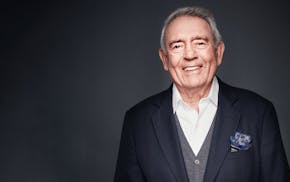LOS ANGELES - Since the advent of television, CBS has had a hard time getting up in the morning. Despite recruiting such heavyweights as Bryant Gumbel, Diane Sawyer, Bob Schieffer and even Dick Van Dyke, the network has always trailed NBC's "Today" and ABC's "Good Morning, America" in the ratings.
So why does CBS stay in the game? Cash, and lots of it.
The desirable demographic of the morning audience -- middle-class workers with spending cash -- offers an irresistible opportunity, coupled with the fact that viewers are unlikely to change channels while making breakfast .
"Not to try would be very foolish," said Chris Licht, former executive producer of MSNBC's "Morning Joe," whom CBS hired to run its new show. While CBS' old "Early Show" drew only half as many viewers as its top rivals, it still reaped $178 million in ad revenues in 2010, according to industry analysts Kantar Media. That's nowhere near the $454 million "Today" pulled in, but it's a nice pile of cash, and it could get bigger.
Two weeks ago, CBS brought in new hosts Charlie Rose and Gayle King at a time when many believe "Today" is vulnerable -- especially if Matt Lauer, its longtime co-host, doesn't renew his contract this year. The new "CBS This Morning" emphasizes longer, more in-depth discussions around a glass table. To give the show breathing room, producers have eliminated national weather updates, cooking segments and fashion shows.
"In the past, the network has tried to do what the other guys do," Gayle King said. "That's not knocking the other guys in any way, but for the first time, you've got a different kind of program. I believe you keep trying until you get it right and I'm thinking we're on the verge of really getting it right."
Rose, who will continue to host his late-night talk show on PBS, is a big reason CBS has a fighting chance, largely because of the gravitas he brings to even the fluffiest stories.
"I was excited to do it, in part because morning television sets the agenda for the day," Rose said. "You have an opportunity to come in in the morning and say, 'What's going on? How do we find the best possible sources to tell these stories? How do we get them to our table?'"
'Good Morning,' indeed
If "CBS This Morning" is optimistic, "Good Morning America" is absolutely giddy.
The ABC series averaged 4.85 million viewers in 2011, up 10 percent from the previous year, while "Today's" numbers have remained roughly the same at 5.42 million. It is the narrowest margin since 1995.
"The 'Today' show is very mighty and they've been mighty for 10 billion weeks," said ABC News President Ben Sherwood, who previously served as "GMA" executive producer. "It's an incredible priority for us to take on, challenge and topple 'Today.'"
Executive producer James Goldston gives a lot of credit to the chemistry of the on-air team, led by Robin Roberts and George Stephanopoulos.
"These guys work and play well together," he said. "You can't fake that."
Having a former top adviser to Bill Clinton during a heated presidential race doesn't hurt. Stephanopoulos' credibility is so high that he'll continue to co-host "GMA" while picking up moderator duties on the Sunday morning news show "This Week." Any fear of burnout?
"George is a trouper and he's excited about it," Goldston said. "He knows he can do it, but we'll have to be cautious."
Others also see a chance to grab a bigger slice of the morning audience -- at even earlier hours. The 5 a.m. broadcast of local Fox affiliate KMSP-TV, Channel 9, is up an astounding 86 percent from a year ago. CNN just launched "Early Start" with Ashleigh Banfield and "Starting Point" with Soledad O'Brien, a block that opens at 4 a.m. MSNBC's "Morning Joe," which starts at 5 a.m., is coming off its hottest year ever.
Host Joe Scarborough, like Rose, believes the morning audience craves meaty material -- something he learned in 2007 when he insisted on doing a live phone interview with biographer Walter Isaacson ("Steve Jobs"), who had just written a book about Albert Einstein.
Despite the producer yelling in his earpiece to end the interview, Scarborough extended it to 30 minutes. It wound up being the show's most-watched half-hour of the year.
"We'll have some boring economist talk about, you know, what's happening in Italy and Greece and the next day, the numbers are always the highest," he said. "We found out early on we were pretty blessed by an audience much more intelligent than us."
What will Matt do?
But all the competition still has a long way to go to pass "Today."
Some speculate that if Lauer decides to move on, NBC is interested in "American Idol" host Ryan Seacrest, who has a development deal with NBC Universal. Seacrest said last week that he can't imagine a future in which he'd leave "Idol," but he still has not renewed his contract, which expires at the end of this season.
Jim Bell, executive producer for "Today," said he believes Lauer will be at NBC and "Today" for a "long time," a thought echoed by TV Guide business editor Steven Battaglio.
"Matt feels like he's built for this," said Battaglio, who talked to every living "Today" host for his book "From Yesterday to 'Today': Six Decades of America's Favorite Morning Show," which came out last year. "Remember when Bryant Gumbel [host from 1982 to 1997] left, he went to start a newsmagazine. Katie Couric [1991-2006] had the 'CBS Evening News' and a chance to make history. There's nothing out there as big as 'Today' for Matt, and I think NBC will do everything they can to keep him."
If Lauer does move on, Seacrest would be capable of taking over, Battaglio said, but NBC will be very careful not to pull a "Norville." That's an insider reference to "Today's" most damaging boo-boo: Abruptly replacing the beloved Jane Pauley in 1990 with relative unknown Deborah Norville, an unpopular move that allowed "GMA" to move temporarily into first place.
"You'd have to bring him in like everybody else," Battaglio said. "Maybe he starts by doing the third hour occasionally. Make him part of the family and make sure you have that viewer acceptance."
In other words, "Today" will do everything it can to keep the competition at bay.
"The people who work on it are very mindful of its legacy and they'll try like hell to protect it," Battaglio said. "They're not going to go down easily."
Jim Bell, executive producer for "Today," said the show continues to lead because it never takes anything for granted and is always evolving, whether it's adding outdoor concerts, sending Lauer around the world or adapting to new media by creating such Web features as "Today in 2 Minutes."
"We're always mindful that there's competition," Bell said. "No one gets too cocky or too comfortable here."
- Follow Justin on Twitter: @nealjustin

Neal Justin: 'Hacks' is TV's best buddy sitcom

TV review: 'The Contestant' peels curtain back on the worst reality show of all time

Minneapolis native Poppy Harlow parts ways with CNN

TV to watch: Dan Rather documentary is second-rate journalism


